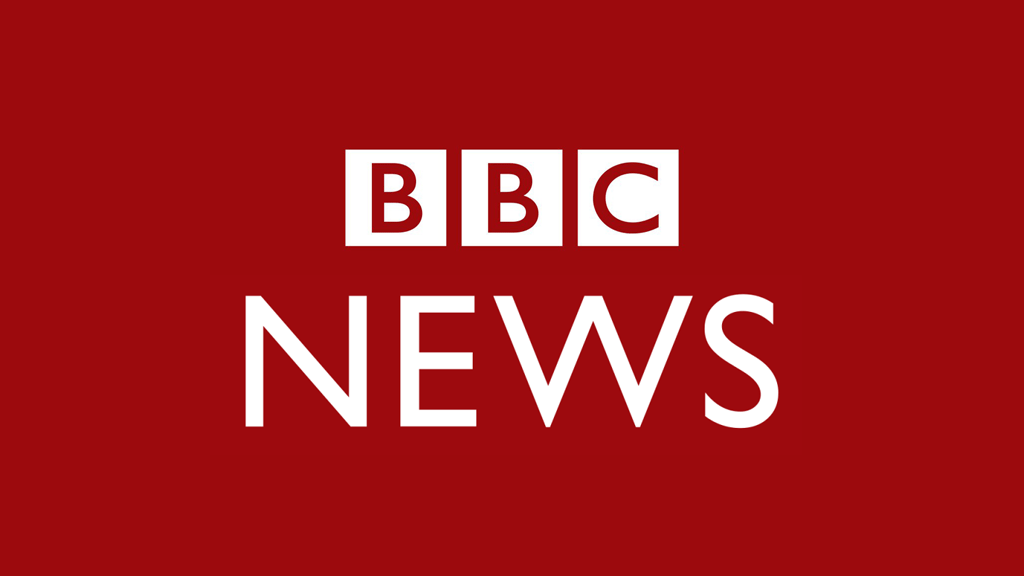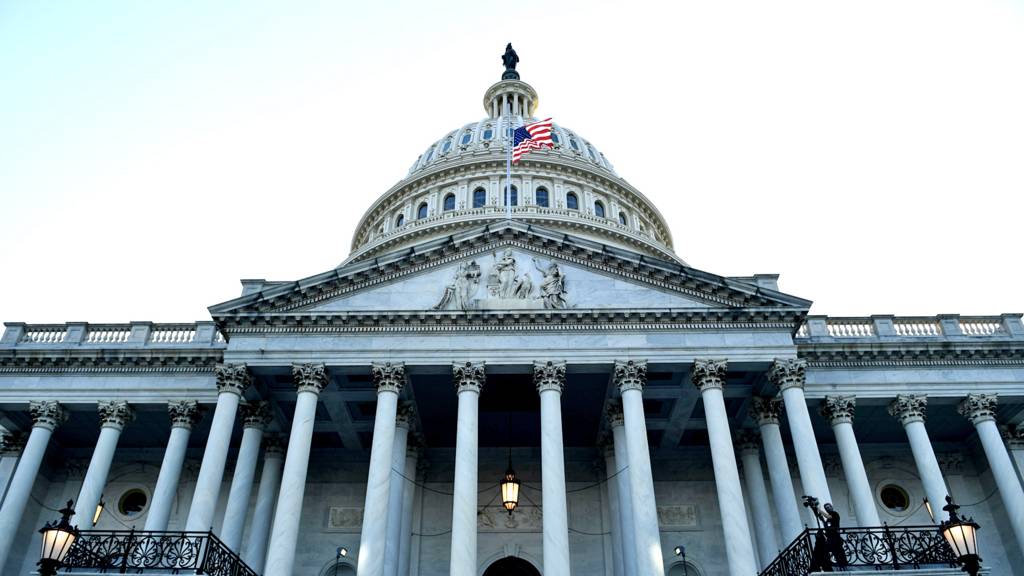
13,258
viewing this page
Related Video and Audio
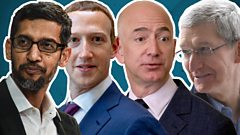
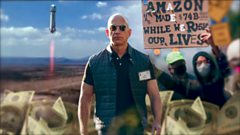
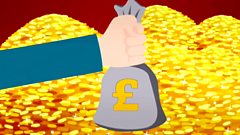
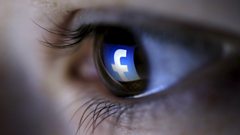
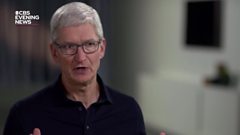
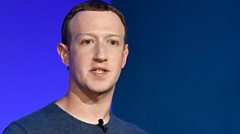


RTL
Got a TV Licence?
You need one to watch live TV on any channel or device, and BBC programmes on iPlayer. It’s the law.
Live Reporting
Leo Kelion and Tom Spender
All times stated are UK
-
Google chief faces scrutiny over ads targeted at kids

Copyright: Reuters
Democratic Congresswoman Mary Scanlon has been asking Sunder
Pichai about YouTube’s policies on content for children. She asks Mr Pichai if
Google has been collecting data on the children who use YouTube.Mr Pichai responds that this is an area the firm takes very
seriously. He says under-13s are not allowed to set up their own accounts, and the firm had invested in a special version of its video clip service, YouTube Kids.Ms Scanlon then asks if YouTube is investing in “luring in”
advertisers by telling them that YouTube is regularly visited by children.“Are you targeting children and then targeting advertisers
to bring them on board?”Mr Pichai responds by saying everything the firm does
complies with regulations.Finally Ms Scanlon asks if content creators are able to
choose which advertisements appear next to their content.“If Sesame Street doesn’t want to show junk food ads on YouTube,
does Google allow them to make that choice?”Mr Pichai says users have a choice – they can use it as a
subscription service without seeing such advertisements or they can use it for
free with ads.He says he is not aware of a report in the Wall St Journal alleging that YouTube is making it difficult for independent auditors to report back to companies on what advertisements are shown alongside their content, but will get back to her about it.
-
Facebook chief quizzed over VR chief’s departure

Copyright: US Congress
Image caption: Matt Gaetz questioned whether Mark Zuckerberg was being truthful Having earlier questioned Google about bias, the Republican Matt Gaetz has now chased Zuckerberg over the issue.
The politician claimed that Facebook’s culture “disadvantages conservatives” and that its employees had been caught out on video revealing their prejudices.
“I certainly do not want our platforms to be run in a way that has any ideological bias,” Zuckerberg replied.
Facebook’s chief declined to get into the specifics of the hidden-camera clips being referenced, but said: “People make mistakes… it’s our job in running the company to make sure that we minimise errors.”
Mr Gaetz then switched tack asking why Zuckeberg had fired Palmer Luckey.
The co-founder of the Oculus virtual reality division Facebook acquired in 2014 was ousted two years later after it emerged he had donated money to an anti-Hillary Clinton group during the presidential election.
“I’m not sure it’s appropriate to get into a specific personnel issue publicly,” Zuckerberg responded.
Mr Gaetz wasn’t satisfied with this.
“I’ve seen the messages where you have specifically directed Mr Luckey to make statements regarding his politics for the benefit of your company,” he said.
“So I think both in the case of these content moderators and in the case of the testimony you just gave regarding Mr Luckey… there is serious question as to whether or not you’re giving truthful testimony here.”
These days Mr Luckey runs a surveillance start-up that is helping patrol the US-Mexico border.
-
Share prices continue to rise

Copyright: Reuters
The US markets are now closed. So how do investors think the tech CEOs are doing?
Obviously, it’s a bit simplistic to link stock prices to their performance – but if the politicians had landed a deadly blow, you might have expected at least one of the companies’ shares to have suffered.
But at the close of trade:
- Apple was 1.9% up
- Alphabet (Google) was 1.3% up
- Amazon was 1.1% up
- Facebook was 1.4% up
-
Tech giants face feeding frenzy

Anthony Zurcher
BBC North America reporter
Four of the world’s top technology
company executives may have been testifying before the Judiciary Committee from
a distance, but they were still caught in the middle of a political storm on
Wednesday afternoon.The stated purpose of the hearing was to
address whether existing anti-trust laws provide sufficient regulation of
transnational tech Goliaths. The reality, however, was that the proceedings – with each member of the committee receiving five minutes to speak – were more
akin to a feeding frenzy, as corporate chiefs faced criticism from every
directionDemocrats
expressed concern that the companies were abusing their power by disadvantaging
competitors or buying them out entirely. Republicans accused the witnesses of
insufficient patriotism and being too cosy with the Chinese.Both sides
expressed outrage over how the companies managed speech and expression on their
platforms. They didn’t go far enough in removing hateful rhetoric and false
information, Democrats said. They singled out conservatives for censorship, the
Republicans countered.Through
it all, the witnesses thanked the questioners and took their lumps, perhaps
confident that they could soon log off and get back to their work. While all
the politicians seemed to agree that the big tech companies were a problem,
their chances of arriving at any kind of solution seems unlikely. -
The four taking part today

Copyright: Getty Images
While we are in another break, a reminder of who the tech chief executives are giving testimony to the House Judiciary Antitrust Subcommittee:
– Mark Zuckerberg launched Facebook while a student at Harvard. It is the biggest social media network in the world. He is the youngest of the four men, aged 36, and has masterminded a series of key takeovers, including WhatsApp, Instagram and Oculus.
– Sundar Pichai, the former chief of Google’s Chrome browser, climbed the ranks to take charge of parent company Alphabet at the end of 2019. He was born in India and is now one of the best compensated chief executives in the US – company filings revealed he earned $281m (£213m) last year.
– Jeff Bezos founded Amazon as an online bookstore in his garage and built it into a giant spanning e-commerce, streaming and cloud computing. He’s the world’s richest man and had never appeared before Congress until now. He regularly sells part of his stock in Amazon to fund another venture, the space transport company Blue Origin.
– Tim Cook joined Apple in 1998, and served as co-founder Steve Jobs’ chief financial officer before taking the top job in 2011. Under his leadership, Apple has made digital privacy one of its core values, and sought to become less reliant on hardware sales by expanding across a range of digital services.
-
‘Counterfeits are a scourge’
Jeff Bezos has been questioned about why Amazon doesn’t do more to remove fake goods sold via its online marketplace.
“Counterfeits are a scourge,” said Mr Bezos.
“It’s bad for customers. It’s bad for honest third-party sellers.”
But the Democratic member Henry Johnson said the panel had heard evidence from one seller that Amazon had only agreed to stop diverting sales to knock-off rivals once the vendor had committed to a $2m advertising spend.
“That’s unacceptable,” responded Mr Bezos.
“If someone, somewhere inside Amazon said ‘you know, buy X dollars in ads and then we’ll help you with your counterfeit problem’, that is unacceptable.
“And I will look into that and we’ll get back to your office with that.”
-
Facebook ‘adapts’ others’ features, Zuckerberg says

Copyright: Reuters
Facebook’s Mark Zuckerberg has once again been pressed on whether his
company stifled competitors by copying their features or forced them into a sale.He said he saw it as part of Facebook’s job to work out
what people found valuable in tech.“We’ve certainly adapted features that others have led in,
as have others copied and adapted features that we have led in,” he explained.But Congresswoman Pramila Jayapal didn’t give up the theme, asking: “Has Facebook ever threatened to clone the products of another company while also attempting to acquire that company?”
“Not that I recall,” said Zuckerberg.
The politician pressed on, asking what he then made of reports that he had threatened to go into “destroy mode” when trying to convince Kevin Systrom to sell Instagram.
“I want to respectfully disagree with the characterisation,” said Zuckerberg.
“It was clear that this was a space that we were going to compete in one way or another. I don’t view those conversations as a threat in any way.”
In any case, Mr Zuckerberg clinched the deal, and Mr Systrom has since quit.
-
Amazon is likened to a drug dealer

Copyright: BBC
The committee chair David Cicilline has pressed Jeff Bezos over claims that his company has an inherent conflict of interest with sellers who use its marketplace.
He said one clothing company had likened receiving a cheque from the online store to getting a fix of “Amazon heroin” – the idea being that it felt good in the short-term to be paid, but ultimately Amazon would cause the seller’s downfall by launching rival products of its own.
“Mr Bezos, this is one of your partners. Why on earth would they compare your company to a drug dealer?” the congressman asked.
“I completely disagree with that characterisation,” replied Mr Bezos.
“I think it’s important to understand that we have a policy against using individual seller data to compete with our private-label products.”
Mr Cicilline made clear he was unconvinced.
“Amazon is only interested in exploiting its monopoly power over the e-commerce marketplace,” he concluded.
“Amazon’s dual role as a platform operator and competing seller on that platform is fundamentally anti-competitive and Congress must take action.”
-
Bezos put on the spot by de-listed book seller’s complaint
Amazon’s Jeff Bezos is presented with a complaint from a family bookseller, who says their business evaporated after being de-listed from his online store.
“I would like to talk to her. It does not at all to me seem
the right way to treat her. And I’m surprised by that. It’s not the systematic
approach that we take,” Mr Bezos said, rejecting accusations his company was “bullying” small suppliers. -
Smoking gun or a fringe conspiracy?

Copyright: EPA
Image caption: Republican Jim Jordan Republican congressman Jim Jordan returned to the theme that tech companies are biased against his party, suggesting Google might tailor its features to aid Joe Biden’s presidential campaign.
“We won’t do any work to politically tilt things one way or another. It’s against our core values,” responded Mr Pichai.
But Mr Jordan went on to bring up a 2016 email, in which he said a Google executive had talked about the “silent donation” Google had made to Hillary Clinton’s campaign.
“We didn’t find any evidence of such activity,” Mr Pichai replied.
Mr Jordan continued, saying the email had referred to Google urging people to vote “in key states”. He suggested this was a reference to the swing states of Nevada and Florida, meaning there had been a deliberate effort to prevent Donald Trump from winning.
“I can assure you we were compliant with the laws in 2016,” said Mr Pichai, adding that Google would obey the law this year as well.
“Can you assure us you are not going to silence conservatives and… you’re not going to configure your features [to favour] Joe Biden?” Mr Jordan said again.
“You have my commitment. It’s always been true and we’ll continue to conduct yourselves in a neutral way,” was the reply.
It seemed to be a relatively calm end to the session until the next politician, the Democrat Mary Gay Scanlon, suggested Mr Jordan had been pushing “fringe conspiracy theories”.
At which point, Mr Jordan reacted with fury, saying: “We have the email – there was no fringe conspiracies.”
-
Does more data mean more money?
In a testy exchange, the Democratic member Val Butler Demings asked Sundar Pichai whether it was true that “the more user data that Google collects, the more money Google can make”.
“That’s not true,” he replied.
“Most of the data today we collect is to help users and provide personalised experiences.”
But before he could flesh out this response – or be challenged over it – the session ended to make way for the next set of questions.
-
‘We’ll assume they are good questions’

Copyright: Reuters
Image caption: Representative David Cicilline, a Democrat and chair of
the antitrust subcommitteeA gentle reminder from the committee chair to the tech bosses that time is short, with each committee member just getting five minutes each.
All four have often begun their answers by thanking the committee for the question.
“We appreciate the gratitude for the questions, and your description of them as good questions, but we’ll just assume that they are good questions and that you are happy to answer them.”
-
Bezos dodges a yes or no question

Copyright: Reuters
Amazon’s Jeff Bezos has finally been asked a question, so it looks like his feed is working – though the picture is a bit fuzzy.
Democratic congresswoman Pramila Jayapal asked him for a “yes or no” answer to whether his firm had ever used seller data to make business decisions.
This was a reference to reports that Amazon had used data gathered from businesses selling products via its site to design and price its own rival first-party goods – something the firm has previously suggested had been limited to a group of rogue employees.
Mr Bezos responded that he couldn’t give in answer in such simple terms.
“What I can tell you is we have a policy against using seller-specific data to aid our private label business, but I can’t guarantee you that that policy has never been violated,” he said.
Ms Jayapal said she remained concerned that Amazon was continuously monitoring its logs to prevent any other business from becoming big enough that it would pose a competitive risk.
-
We’re back, with more questions for Sundar Pichai
The hearing is back in business and with questions for Alphabet’s Sundar Pichai on General Data Protection Regulations (GDPR).
Republican Kelly Armstrong makes the case that the privacy law has helped entrench Google’s market-leading position rather than weaken it.
Mr Pichai responded: “We see robust competition in the marketplace [and] we have to comply with regulation.”
-
Technical hiccup halts the hearing
Leo Kelion
Technology desk editor

Copyright: BBC
The hearing has had to pause because of a technical problem with one of the feeds – presumably that of Amazon’s Jeff Bezos, who hasn’t spoken in a while.
So far there’s been lots of accusations thrown the tech CEOs way, but little if any damage done.
A consequence, perhaps, of switching topic and leader after relatively brief sessions, helping the well-prepared business chiefs swat away the claims of wrongdoing lobbed their way.
-
Google accused of collaboration with China

Copyright: Reuters
Republican congressman Matt Gaetz claimed that Google collaborates with Chinese universities that take “millions upon millions of dollars from the Chinese military” and noted that tech investor Peter Thiel had previously accused the company of “treason”.
Sundar Pichai – chief executive of parent company Alphabet – denied that his employees were acting against American interests.
“We are not working with the Chinese military it’s absolutely false,” he said.
“What we do in China, compared to our peers, it’s very very limited in nature.
“Our AI work in China is limited to a handful of people working on open source projects.”
-
No questions yet for Jeff Bezos
We are an hour and a half in to the hearing and yet to hear from Amazon’s Jeff Bezos, apart from his opening remarks. Most of the questions have been for Facebook’s Mark Zuckerberg and Alphabet’s Sundar Pichai.
-
Tim Cook challenged over App Store rules

Copyright: EPA
The Democrat congressman Henry Johnson raised concerns about Apple’s App Store, suggesting its moderators made up rules “as they go” and then arbitrarily interpreted them.
He added that it appeared that the rules were sometimes “changed to benefit Apple at the expense of [third-party] developers” and also discriminated between different creators.
“Sir, we treat every developer the same,” Mr Cook responded.
“We have open and transparent rules… we do look at every app before it goes on. But those apps, those rules apply evenly to everyone.”
Mr Johnson went on to suggest there was nothing to stop Apple raising its cut of app sales from the existing level of 30% to 50%.
Mr Cook replied that he strongly disagreed with this.
“There is a competition for developers,” the Apple chief said, saying software creators could switch their efforts to Android, Windows, Xbox or PlayStation.
-
Zuckerberg responds to case of mistaken identity
Republican congressman Jim Sensenbrenner asked Mark Zuckerberg why a post by the US president’s son, Donald Trump Jr, had been taken down because it discussed the efficacy of the drug hydroxychloroquine.
Mr Zuckerberg noted that happened on a rival social network, but answered the point.
“I think what you might be referring to happened on on Twitter, so it’s hard for me to speak to that. But I can talk to our policies.
“We do prohibit content that will lead to imminent risk of harm.
“We do not want to become the arbiters of truth… [but] if someone is going to go out and say that hydroxychloroquine is proven to cure Covid, when in fact it has not been proven to cure Covid, and that statement could lead people to to take a drug that that in some cases, some of the data suggests that it might be harmful to people – we think that we should take that down.”

Copyright: Getty Images
Image caption: Twitter temporarily banned Trump Jr from tweeting on Tuesday -
Bezos just got richer

Rory Cellan-Jones
Technology correspondent
During the hour’s delay before the hearing got underway, Amazon’s share price rose by about 0.5%.
I’m not sure how much richer that makes Jeff Bezos, but it is probably more than $500m.

